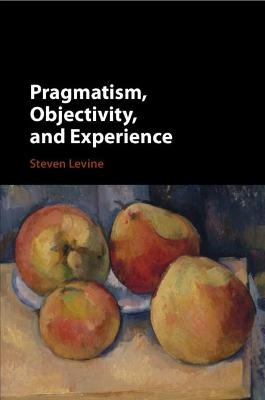
Pragmatism, Objectivity, and Experience
Seiten
2021
Cambridge University Press (Verlag)
978-1-108-43592-5 (ISBN)
Cambridge University Press (Verlag)
978-1-108-43592-5 (ISBN)
Explores the relation between objectivity and experience, challenging metaphysical approaches and arguing that objectivity depends on experience as understood by the classical pragmatic tradition. Re-evaluating pragmatism on contemporary terms, this book will be important for philosophers seeking new perspectives on objectivity.
In this book Steven Levine explores the relation between objectivity and experience from a pragmatic point of view. Like many new pragmatists he aims to rehabilitate objectivity in the wake of Richard Rorty's rejection of the concept. But he challenges the idea, put forward by pragmatists like Robert Brandom, that objectivity is best rehabilitated in communicative-theoretic terms - namely, in terms that can be cashed out by capacities that agents gain through linguistic communication. Levine proposes instead that objectivity is best understood in experiential-theoretic terms. He explains how, in order to meet the aims of the new pragmatists, we need to do more than see objectivity as a norm of rationality embedded in our social-linguistic practices; we also need to see it as emergent from our experiential interaction with the world. Innovative and carefully argued, this book redeems and re-actualizes for contemporary philosophy a key insight developed by the classical pragmatists.
In this book Steven Levine explores the relation between objectivity and experience from a pragmatic point of view. Like many new pragmatists he aims to rehabilitate objectivity in the wake of Richard Rorty's rejection of the concept. But he challenges the idea, put forward by pragmatists like Robert Brandom, that objectivity is best rehabilitated in communicative-theoretic terms - namely, in terms that can be cashed out by capacities that agents gain through linguistic communication. Levine proposes instead that objectivity is best understood in experiential-theoretic terms. He explains how, in order to meet the aims of the new pragmatists, we need to do more than see objectivity as a norm of rationality embedded in our social-linguistic practices; we also need to see it as emergent from our experiential interaction with the world. Innovative and carefully argued, this book redeems and re-actualizes for contemporary philosophy a key insight developed by the classical pragmatists.
Steven Levine is Associate Professor in the Department of Philosophy at the University of Massachusetts, Boston. He has published many articles on classical and contemporary pragmatism, as well as on figures including Sellars, Brandom, McDowell, and Davidson.
Introduction; Part I: 1. Rorty and the rejection of objectivity; 2. Brandom, pragmatism, and experience; 3. Communication, perception, and objectivity; Part II: 4. An experiential account of objectivity; 5. Pragmatism, experience, and answerability; 6. Meaning, habit, and the myth of the given; Conclusion.
| Erscheinungsdatum | 09.03.2021 |
|---|---|
| Zusatzinfo | Worked examples or Exercises |
| Verlagsort | Cambridge |
| Sprache | englisch |
| Maße | 152 x 228 mm |
| Gewicht | 407 g |
| Themenwelt | Geisteswissenschaften ► Philosophie ► Erkenntnistheorie / Wissenschaftstheorie |
| Geisteswissenschaften ► Philosophie ► Metaphysik / Ontologie | |
| ISBN-10 | 1-108-43592-0 / 1108435920 |
| ISBN-13 | 978-1-108-43592-5 / 9781108435925 |
| Zustand | Neuware |
| Haben Sie eine Frage zum Produkt? |
Mehr entdecken
aus dem Bereich
aus dem Bereich
die Grundlegung der modernen Philosophie
Buch | Softcover (2023)
C.H.Beck (Verlag)
CHF 25,20
Buch | Softcover (2023)
Reclam, Philipp (Verlag)
CHF 9,80

![Was heißt Denken?. Vorlesung Wintersemester 1951/52. [Was bedeutet das alles?] - Martin Heidegger](/media/113619842)
